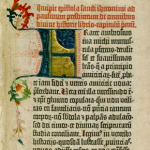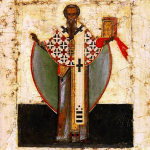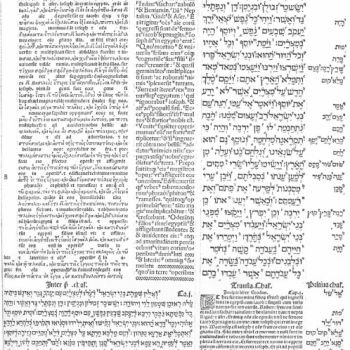The Synod of Jerusalem
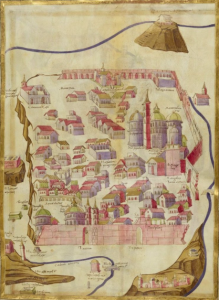
Map of Jerusalem (1472) by Pietro del Massaio
and Hugo Comminelli.
Our text here is the lesson from the Sixth Sunday in Easter, the Sunday before Ascension. It’s from Acts 15, and recounts the Church’s first-ever synod, or council, which is thought to have been held around the year 50. The First Council of Nicæa, the source of the Creed,1 took place two hundred and seventy-five years after this; to the Nicene bishops, the Synod of Jerusalem was as long ago as the French and Indian War is to us.
I like thinking of the Synod of Jerusalem as a sort of zeroth ecumenical council. Most of the Twelve are still alive and in attendance; the new “Nazarene” sect of Judaism is still so young that “Gentile Christian” is a baffling phrase to a lot of people; the vibe is completely different. Above all, unlike later councils, the Synod of Jerusalem is strictly halakhic2 in nature—it’s strictly about the application of the Torah in daily life. A doctrinal issue is present, and the doctrine is the basis for the halakhah,2 but for the most part, the content of the faith enters in only implicitly, as a background already understood and assumed. After this, the Church experiences a major pivot in her whole mode of life. This is what makes the rest of Christian history and a majority-Gentile Church possible.
What About Two-Sides-ism
But what, pray tell, does this have to do with anti-racism?
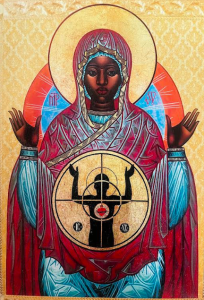
Our Lady of Ferguson (2015), an ikon written
by Mark Doox.
Well, let’s clarify a couple things. First, I don’t mean “Christians have a moral duty to both read and agree with Ibram X. Kendi’s How to Be an Antiracist,” or something like that. (I’m not sure there can be a moral duty for Christians to read any book besides the Bible; and anyway, I haven’t read Kendi and don’t know what he thinks.) The point here is not that we must subscribe to leftist politics. It is that we must be anti-racists—which is assuredly going to affect our politics, especially in the present climate. Now, I admit I’d expect a well-informed person of good sense who converted to Catholic Christianity, and sincerely submitted their political ideas to the Lord, to either remain or move noticeably to the left of the American average. (I say this not because I fancy anybody is looking to me for political guidance, but to clarify the perspective I’m bringing to the topic.) However, that’s largely because—like most people—I think my views are correct. It isn’t because there’s some inherent link between “being a Christian” and “being politically left of the national average” that exists for all times and places.
And it is possible for intelligent people of good will to differ about what the fairest and most effective means of putting our anti-racism into practice are. I have no desire to take God’s name in vain by attaching an untruthful “thus saith the Lord” to political strategies, merely because I prefer them to the alternatives. I could be mistaken; it’s happened before.
Textus Pretextus
With those provisos in place, I wish to point out a pretext under which racism is often concealed or excused, that’s ruled out by this text.
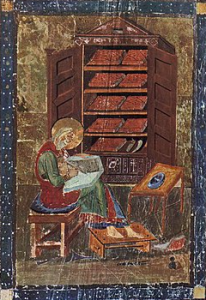
A depiction of Ezra the Scribe from the Jarrow
Codex (completed c. 700, considered the best-
preserved manuscript of the Vulgate).
The pretext at stake is the one expressed in phrases like “I only want to preserve my culture,” “it’s not hate, it’s heritage,” and so on. Fascistic racists are particularly apt to claim that what they are concerned with is “protecting” a culture or a way of life, not a literal bloodline or ancestry group (even if an ethnicity is overwhelmingly aligned with biological descent, there are always some exceptions, like how the formerly Norman FitzGerald dynasty were adopted into being Irish). This is a strong move, as it lets them sound a lot more politically sophisticated than, say, the “fourteen words.”
It’s also a barefaced lie. (Or rather, there are a few naïve fellow-travelers with fascists, who learn to say things like this because they think the rest mean them sincerely.) The real purpose of claims like these is to lend weight to tokenizing tactics—stuff like “See? Our organization’s vice president is biracial; we’d hardly put up with that if we ‘hated Black people,’ would we?”
It is worth pausing to say: Yes they would. Like many sins, racism isn’t, and can’t be, practiced consistently. I mean, we’re talking about a delusion that prejudices against entire ethnicities are not only normal and acceptable ways of thinking, which is already ludicrous, but that these prejudices are so above critique, not sharing these prejudices is somehow disloyal to your kin. In reality, being prejudiced against any entire ethnicity is not only unjust—and for a Christian, sacrilegious—but extremely juvenile. It isn’t just wrong; it is that which is, on the internet, worse than wrong: cringe.
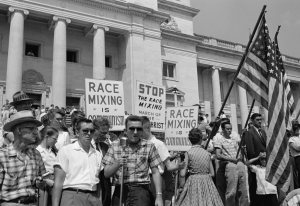
A rally held in Little Rock in 1959,
opposing school integration.
Still, most people who cling to this delusion and try to rationalize it, will at the same time be prepared to recognize a few people from among their target group as “the good ones.” This is, in a grim way, amusing, but it’s no mystery. Even most shameless misogynists love their mothers, but they find a way to misogyne all the same.
After seeing a clip from one of the White House Press Secretary’s “briefings” of the media earlier this month, a pertinent quote from a horror podcast I like (The Magnus Archives) has been echoing in my mind. Discussing his wife, a more significant player in the series’ events, a minor character says, “She didn’t lie to me because she expected me to believe her; she lied because she expected me to obey her.”3
Textus Rejectus
But to bring this all back to the first-century controversy resolved at the Synod of Jerusalem. Many racists, and especially those of fascist sympathies, try to maintain that their views are “not really racism” (you’ll note that most things that are, in the form of a question, called “the real racism” are directed against white people). They claim it’s about heritage, culture, tradition—things to which surely there can be no objection.
… Except heritage, culture, and tradition, merely for their own sake, are exactly the things which the Synod resolved not to impose on Gentile converts here. And as if to make this exact point (which “seemed good to the Holy Ghost and to us”), the things “loosed on earth and in heaven” here are not the cultural distinctives of just anyone. They are those of the Jews—the only nation that can, on Christian premises, advance any serious claim to divine election as a nation, the only ethnicity that appears in Scripture to matter qua ethnicity.

The Caravan of Abraham (c. 1900),
by James Tissot.
What advantage then hath the Jew? or what profit is there of circumcision? Much every way: chiefly, because that unto them were committed the oracles of God. For what if some did not believe? shall their unbelief make the faith of God without effect? God forbid: yea, let God be true, but every man a liar … I could wish that myself were accursed from Christ for my brethren, my kinsmen according to the flesh: who are Israelites; to whom pertaineth the adoption, and the glory, and the covenants, and the giving of the law, and the service of God, and the promises; whose are the fathers, and of whom as concerning the flesh Christ came, who is over all, God blessed for ever. Amen. … God hath not cast away his people which he foreknew.
—Romans 3:1-4a, 9:3-5, 11:2a
Not only is Christianity incompatible with more obvious forms of racism, the forms that blaspheme God in his images—that is, human beings—directly. The Church here, at her most pristine, is also shown recognizing and rejecting what we might call the “soft racist” ideology that twentieth and twenty-first century nationalists like Stephen Wolfe want to promote. (I’m especially stuck on Wolfe, because it just flabbergasts me that a Calvinist, of all people, would seriously advance the argument that “preferring” your own race is fine and good because it’s “human nature.” The thought, not even of what R. C. Sproul would actually say in rebuke to this, but of the mere tone of voice with which he’d say it, is a tonic imaginative exercise that I recommend to everyone.) In the end, the image of God in man, and in Christ “the taking of that Manhood into God,” are both abhorrent to this ideology; for our neighbor need not be even culturally white, and Jesus Christ was not and is not.
Which kind of tracks with what the book of Acts is, you know, about.
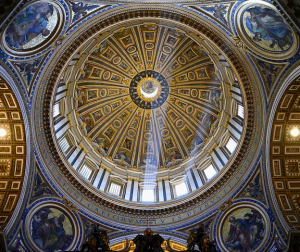
Dome of St. Peter’s Basilica in Rome, with
pendentives portraying the Evangelists.
Photo by Joaquim Alves Gaspar, used under
a CC BY-SA 4.0 license (source).
At its very beginning, death itself has just been undone. Both the Ascension and the sending of the Holy Ghost indicate that the separation between humanity and God, endured like death since our expulsion from Eden, is now unraveling; accordingly, the world is flooded a second time, not now with water but with fire, and the spell of Babel is broken. At the same time we hear Israel’s journey from Egypt to the Holy Land rehearsed in sermon after sermon, we see the gospel crossing from Judea to Samaria, from Samaria to Syria, from Syria to Anatolia, and from Anatolia to Greece, from which the keen-eyed can descry the shoreline of Rome, where the capital-in-exile is soon to be set up, out in “the uttermost part of the earth.” As it is written: “In thee shall all families of the earth be blessed.”
To be continued …
Footnotes
1Well, sort of. Baptismal creeds had already existed for a long time, like the Apostles’ Creed, and the Nicene Creed (the one we recite at Mass most Sundays, also called the Credo) was modeled on them. Moreover, the text of the Nicene Creed itself was fixed not at Nicæa in 325, but in 381, at the First Council of Constantinople. (This is why you’ll see it called the Niceno-Constantinopolitan Creed, if you hang out around enough people with strong opinions about how to reunite Catholicism and Orthodoxy.)
2Halakhah means the application of the Torah to day-to-day life; it extends and specifies the Written and Oral Torah, and is required to address new circumstances in terms of existing law. (The word comes from the Hebrew הֲלָכָה [hàlâkhâh], itself derived from the verb for “to walk”; note the resonance between this and Christ’s self-identification as “the Way.”) For example, it seems that chickens were originally domesticated for use in cockfighting—which means that when people did start eating them, a halakhic decision on whether this was permissible for Jews was required. This does bring in certain questions of principle, like whether one should be “strict constructionist” and allow only animals expressly mentioned in the Torah to be eaten, or “broad constructionist” and allow whatever is not ruled out, especially since the kashrut are given mainly in the form of principles (see Leviticus 11:2-4); still, it brings in the theology only indirectly. One of the principal effects of the Synod of Jerusalem, however, was to reduce obligatory Christian halakhah to vanishing point.
3The pertinent episode is MAG 154, “Bloody Mary.” If you’re new to the series, please note that this episode occurs near the end of the fourth season (of five all told); I advise beginning instead at the beginning of the first season, namely with MAG 1, “Angler Fish.”


